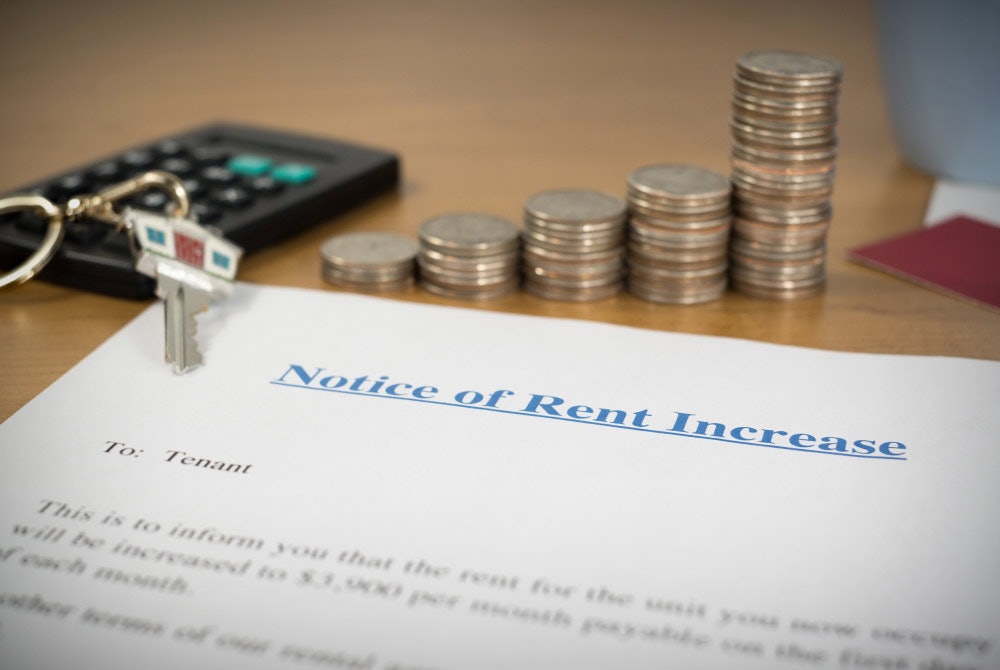- What a Rent Increase Letter Contains
- How to Respond to a Rent Increase Letter
- Rent Increase Laws Protecting Tenants
- Rent Control: What It Means For You
- Frequently Asked Questions
A rent increase letter is something your landlord or property manager sends you to notify you that your rent is about to go up. Depending on which state you live in, you may get advance written notice (as much as 60 days notice), and it will tell you the date the rent increase takes effect.
What a Rent Increase Letter Contains
The rent increase letter should contain the following information:
- The date your rent will be increased.
- What your new monthly rent will be.
- The deadline to accept or reject the increase.
- The date your lease ends, should you reject the rent increase.
- How to contact the landlord to accept or decline the rent increase.
Only Month-to-Month Rent Can Be Increased
If you're on a long-term lease (more than a month at a time), it's not legal for your landlord to increase your rent prices during your lease term. Your rent can only be increased when your lease expires, and a new rental agreement is written up with the new price.
Some landlords may include additional information when sending a rent increase letter to justify the increase. For example, they may add attachments to show the average rental prices for similar properties in the area.
How to Respond to a Rent Increase Letter
As the tenant, you have three options when responding to a rent increase letter. The most important thing is that you respond by the deadline, or you may need to move out at the end of the month.
Here are your options:
- Accept the increase—you'll be able to stay in the rental and you'll pay the new rent amount from the date specified in the letter.
- Decline the increase—you'll need to move out on the date specified by your landlord.
- Negotiate a new price—this isn't always possible, but it's worth a shot if you want to meet somewhere in the middle.
After responding to the rent increase letter, your landlord should provide additional instructions or confirmation that they received your response. The letter is considered a legal document, so you probably won't receive a new contract from your landlord with the new price.
Rent Increase Laws Protecting Tenants
Depending on your state, there may be rent stabilization laws limiting how much your landlord can increase your rent. In some cases, your city may also have specific laws that differ from state rules.
The standard regulations around rent increases provide rules around:
- The number of days the landlord must give notice
- How much your monthly rent can be increased (percentage)
Your rent may also be capped to a specific dollar amount by rent control (more on that below).
Unfortunately, most states don't restrict the amount your rent can be increased by. Some states have even prohibited laws around rent increases, favoring the rights of landlords over tenants in this regard.
Rent Increase Limits: State Laws
| State | Minimum Notice | Max Increase Allowed |
| Alabama | 30 days | n/a |
| Alaska | 30 days | n/a |
| Arizona | n/a | n/a |
| Arkansas | n/a | n/a |
| California | 30 days (for <10% increase) 60 days (for >10% increase) |
5% + Consumer Price Index |
| Colorado | n/a | n/a |
| Connecticut | n/a | n/a |
| Delaware | 60 days | n/a |
| Florida | 15 days | n/a |
| Georgia | n/a | n/a |
| Hawaii | 45 days | n/a |
| Idaho | 15 days | n/a |
| Illinois | 30 days | n/a |
| Indiana | 30 days | n/a |
| Iowa | 30 days | n/a |
| Kansas | 30 days | n/a |
| Kentucky | n/a | n/a |
| Louisiana | n/a | n/a |
| Maine | 45 days | n/a |
| Maryland | n/a | n/a |
| Massachusetts | 30 days | n/a |
| Michigan | n/a | n/a |
| Minnesota | 1 month + 1 day | n/a |
| Mississippi | n/a | n/a |
| Missouri | n/a | n/a |
| Montana | n/a | n/a |
| Nebraska | n/a | n/a |
| Nevada | 45 days | n/a |
| New Hampshire | 30 days | n/a |
| New Jersey | 30 days | n/a |
| New Mexico | 30 days | n/a |
| New York | n/a | n/a |
| North Carolina | n/a | n/a |
| North Dakota | 30 days | n/a |
| Ohio | n/a | n/a |
| Oklahoma | n/a | n/a |
| Oregon | 30 days | 7% (except for units less than 15 years old) |
| Pennsylvania | n/a | n/a |
| Rhode Island | 30 days 60 days (for tenants over 62 years old) |
n/a |
| South Carolina | n/a | n/a |
| South Dakota | 30 days | n/a |
| Tennessee | n/a | n/a |
| Texas | n/a | n/a |
| Utah | n/a | n/a |
| Vermont | 60 days | n/a |
| Virginia | n/a | n/a |
| Washington | 30 days | n/a |
| West Virginia | n/a | n/a |
| Wisconsin | 28 days | n/a |
| Wyoming | n/a | n/a |
(Source: iProperty Management, 2022)
Note that the required notice for rent increases is shorter if the lease is shorter than month-to-month (for some states).
Rent Control: What It Means For You
Another factor that can influence the cost of your rent is rent control—specific laws that cap how high rent can be in certain areas and how much rent can be increased by each year. Rent control can be enforced by both state and local laws and are in place to make the rental market more affordable for low- and moderate-income residents.
Rent control laws may change from time to time, especially when there's a shortage in affordable housing (e.g., during an economic downturn or pandemic).
If you receive written notice that your landlord is raising the rent, you should look up your local rent control laws and make sure your landlord isn't trying to charge you more than they're allowed to.
Rent Control vs. Rent Stabilization: What's the Difference?
Rent stabilization limits how much your landlord can increase your rent at the end of your lease (both month-to-month and longer-term leases). On the other hand, rent control caps your rent at a specific dollar amount—in some cases, your landlord won't be able to increase your rent at all.
States With Rent Control
As of February 2022, the following states have either statewide or local rent control laws enforced:
- California
- New York
- New Jersey
- Maine
- Maryland
- Oregon
Washington, D.C. also has statewide rent control in place.











Comments